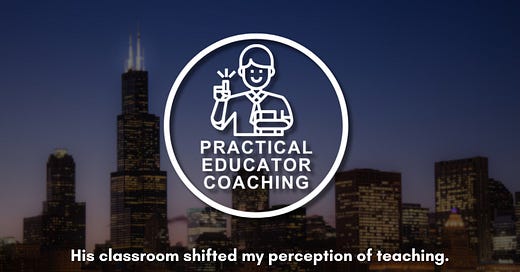Hey, how’s it going? I’m Erik Johnson—a veteran social studies teacher, university professor, and educator coach. In this newsletter, I share practical teaching tips, deep dives into education topics, and the occasional piece on my personal interests. If it’s your first time here, take a look at my coaching homepage, and don’t forget to subscribe!
An Interview with Graham Kwiatkowski
This summer, I’m featuring interviews with teachers I know and respect. My goal is for these conversations to inspire veteran educators as they prepare for the fall and to guide new teachers as they get ready for their first year in the classroom.
I still remember the first time I set foot in Graham’s class. I was a baby teacher, still in (or maybe just finishing) graduate school. I’d built a connection at the school where I now work alongside Graham, and I was doing my best to show I was genuinely interested in joining the community. On my own time, I went in to observe teachers in the social studies department.
I was impressed by everyone I saw, but I was blown away watching Graham start his class.
Even back then, my approach to teaching leaned heavily on my performance background. I teach at a 12 out of 10 energy level. As one of my students once wrote in a 2017 end-of-year reflection, “I would give the newcomers advice about Mr. Johnson. He may be very loud at times but that’s just what he does to make the most of his job.”
Graham, on the other hand, embodied a cool and welcoming calm. His classroom felt peaceful. This was before the era of “lofi beats to study to,” but Graham’s vibe was exactly that. His tone was warm and inviting, and he held that energy the entire period. Watching him shifted how I understood a class a class could be conducted.
It’s been an honor to work with and learn from Graham over the past ten years.
So, without further ado, enjoy this Summer Teacher Feature on Graham Kwiatkowski.
“For the new teacher, the young teacher, I would say: Do not convince yourself you're in this all alone. There will be educators around you, some far older, some even younger, who will gladly share their minds with you when you feel trapped within your own.”
How would you describe yourself as a person?
Outside of the classroom, I would describe myself as fun-loving, curious, active, and an explorer: I firmly believe there is always more to see and learn about this world, even as I try to bring so much of it into my classroom itself.
How would you describe yourself as a teacher?
Inside the classroom, I believe I am patient, calm, understanding, and always ready to learn from my students themselves.
What do you consider your greatest strength as an educator?
My greatest strength as an educator is my willingness to adapt, to change, and to still engage with a world that has changed tremendously over my last 18 years as an educator. That may be more than one strength, but I see a through-line there!
Can you describe a challenge from last school year and how you turned it into a win?
This past school year, my biggest challenge was teaching a re-vamped AP Psychology curriculum and testing structure for the AP test itself. That was daunting and intimidating after the same structure for 17 prior years. But, my students bought in to the challenge. My students made it a win, and I do not even know yet what their AP scores are. I set clear expectations, fostered a supportive atmosphere, and the young people showed real dedication. You wonder, at a certain point in your career, if you can still bring the magic and inspire young people to feel the same. I am proud of what I saw them bring to their desks every day.
What’s something new you’re excited to try next year?
Next year, I am excited to have freshmen for the first time in more than a decade; I believe my older, semi-wiser, more patient self can better serve the needs of our younger population in ways I hadn’t fully developed so long ago. I’m excited to be the teacher for that age group that I wasn’t in years past.
Is there a quote, book, or idea that’s shaped your teaching?
The professor and pacifist Howard Zinn wrote ”You Can't Be Neutral On a Moving Train,” and his words as an educator during our Civil Rights struggle and beyond have never left me.
If a new teacher or a struggling teacher were to read this, what’s one piece of advice you’d want them to carry into the year?
For the new teacher, the young teacher, I would say: Do not convince yourself you're in this all alone. There will be educators around you, some far older, some even younger, who will gladly share their minds with you when you feel trapped within your own. I thought I had all the answers, and I was wrong. Secondly, you will fail, and it will keep you up nights. And those same nights, all your kiddos may have not thought a single thing wrong with your class of the very same day. A final thought: One day, you will be the ear a young person desperately needed, for a kid you may have never even thought, and those are the days you will be glad you’re doing what you do. Give them that time and space to speak.





